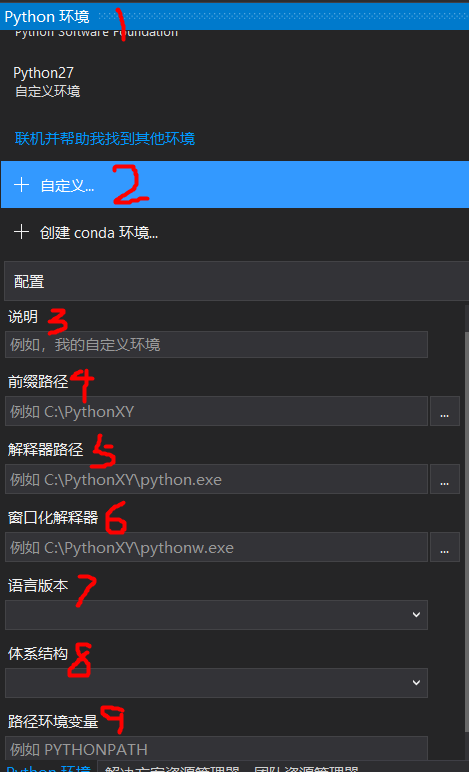VisualStudio19 and Python
- 目前无法从==VisualStudio17==中直接创建Conda环境,但是可以首先通过conda创建好环境后,再利用手动添加配置的方式添加相应的环境
- 具体步骤

- 打开(1)Python环境
- 选择(2)自定义
- 前缀路径(4)选择conda创建虚拟环境的文件夹
- (5)选择(4)文件夹中的python.exe
- (6)选择(4)文件夹中的pythonw.exe
- (7)选择虚拟环境中的Python版本
- (8)根据自身机器情况选择
- (9)忽略,不用填写
使用如下两行代码在运行时检测Python版本信息
1
2import platform
print(platform.python_version())PyTorch基础
- An open source machine learning framework that accelerates the path from research prototyping to production deployment.
windows 下通过运行
来查看CUDA 版本 1
2
3
4
5
6* 
3. Use ```nvcc --version``` to check the cuda versin under Linux
4. 在Conda创建好的目标环境下,利用官网、手动配置Conda下安装PyTorch包的命令
* 
5. Windows下使用Python:
* ```>= VisualStudio17 | Conda | 其它软件PyTorch–Features
- 如下三个没有测试成功
- DISTRIBUTED TRAINING
- C++ FRONT-END
- CLOUD PARTNERS
- 如下三个没有测试成功
- PyTorch的torch.nn中包含了各种神经网络层、激活函数、损失函数等等的类。我们通过torch.nn来创建对象,搭建网络。
- PyTorch中还有torch.nn.functional,让我们可以通过调用函数的方式,来直接搭建网络,而不用像torch.nn一样要先创建对象
dim)``` this is used to return the max value of special dim of tensor, ```1``` represents the row while ```0```represents col 1
2
310. the ```item()``` in torch used to return the pure value of a tesor whose size if ```1```
11. We should not use write.close(), so interupte
12. 返回每列最大值:```np.max(a, axis = 0)``` ; 返回每行最小值:```np.min(a, axis = 1)代码实例
-
1
2
3
4
5
6
7
8
9
10
11
12
13
14
15
16
17import numpy as np
a = np.ones(4)
# both two can create tensor fraom numpy array
# but the operations on a only effect c not b
# I think it is the biggest different
b = th.tensor(a)
c = th.from_numpy(a)
print (a)
print (b)
print (c)
np.add(a, 1, out = a)
print (a)
print (b)
print (c) 更改数组形状(改变原始数组):
3)``` ; 更改数组形状(不改变原始数组):```a.reshape(2, 3)``` 1
4. ```y.data.norm() ``` is equivalent to ```torch.sqrt(torch.sum(torch.pow(y, 2)))
Must be careful during coding, because even a ==,== can cost you ==an hour==

